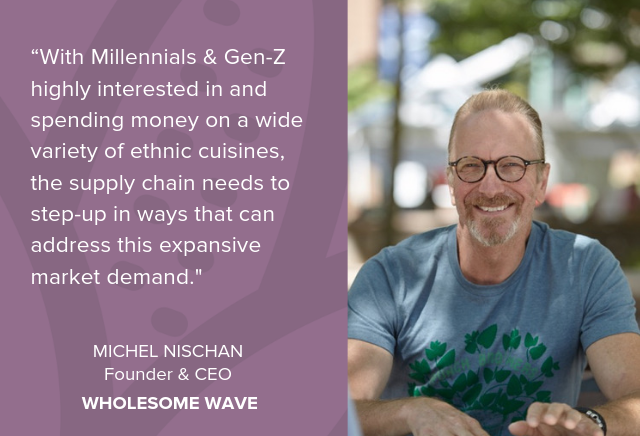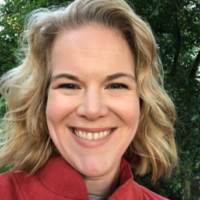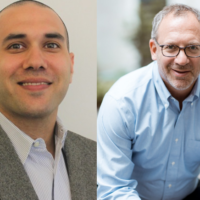
Food+Tech Connect and The Future Market are hosting Biodiversity: The Intersection of Taste & Sustainability, an editorial series featuring interviews with over 45 leading food industry CEOs, executives, farmers, investors and researchers on the role of biodiversity in the food industry. Read all of the interviews here.
Wholesome Wave enables underserved eaters to make healthier food choices by increasing affordable access to locally and regionally grown fruits and vegetables. Now, the team behind Wholesome Wave is launching Wholesome Crave, a for-profit, socially responsible soup company created to directly benefit Wholesome Wave.
Below, I speak with founder and James Beard Award winning chef Michel Nischan about how he and Wholesome Crave think about biodiversity. As Millennials and Gen-Z look for more global and flavor-driven food experiences, he argues, we need supply chains and foods that better meet their needs, which also happens to support biodiversity.
______________________________
Danielle Gould: Why is biodiversity a priority for Wholesome Wave and Wholesome Crave?
Michel Nischan: Wholesome Wave focuses solely on making produce available to food insecure families. Wholesome Crave will be prioritizing biodiversity in the food supply chain once we’re up and running. We will continue working to expand market demand for an array of biodiverse ingredients to be able to offer exciting and stimulating flavor profiles, cultural appeal and to differentiate Crave from existing offerings.
DG: How does Wholesome Wave and Wholesome Crave define and think about biodiversity?
MN: Crave looks at biodiversity as an essential component in creating a new reality in a supply chain currently very limited in any meaningful diversity. We know that by pleasing our eaters and offering them greater diversity, the resulting demand at scale could have positive environmental and human health impacts.
DG: What is the business case for products that promote a more biodiverse food system?
MN: Biodiversity equals flavor excitement. With Millennials and Gen-Z highly interested in and spending money on a wide variety of ethnic cuisines, the supply chain needs to step-up in ways that can address this expansive market demand. Planting biodiverse crops, and marketing them appropriately/accordingly, would provide quite a competitive advantage, considering how so much of the current supply chain is held by “old-school – big-food” companies.
DG: What investments need to be made to create a more biodiverse food system?
MN: Agricultural land leases need to go well beyond the current norm of year-to-year. Harvesting equipment for multiple varietals of legumes, grains and specialty crops. Ag technology to respond to changes in climate linking to varietals that grow well in draught, heavier rain patterns, etc.
DG: What are the greatest challenges and opportunities your organizations faces for creating a more biodiverse system, and what are you doing to overcome or capture them?
MN: The current food supply chain is set up more for efficiency than diversity. Market demand will be the answer here, as well as logistics tech that can introduce producers directly to the end user. There is plenty of supply chain infrastructure to support wheat, but Teff cannot be run through the same infrastructure, other than the transportation element.
DG: Does your average consumer care about biodiversity today? No, but that is changing. Why should they care?
MN: With the rapidly growing number of eaters (who are already craving diverse flavor) expressing their values regarding the environment, labor practices, sustainability and so on, biodiversity is a consistent solution. How do you (or will you) get them to care? By delivering exceptional flavor coupled with using digital communication to demonstrate the end benefit to under-served communities, directly to the eater.
DG: What are some of the most important things food manufacturers can do to support biodiversity? Retailers? Other key parts of the food supply chain?
MN: Vary the ingredients they use in their products. Onions, carrots and celery can be found in 70 percent of a full portfolio of a soup company’s product list.
DG: Are there certain products you would like to see more of in the food industry that would help promote a more biodiverse agricultural system?
MN: Asian, site-specific Central American, fermented, ancient grains and legumes.
Read all of our biodiversity interviews here and learn more about Biodiversity at The Future Market.
______________________

Credit:Tom Hopkins
Michel Nischan, Chef, Author and Food Equity Advocate Founder & CEO, Wholesome Wave & Wholesome Crave
Michel Nischan is a four-time James Beard Award winning chef with over 30 years of leadership advocating for a more healthful, sustainable food system. He is Founder and CEO of Wholesome Wave, Co-Founder of the James Beard Foundation’s Chefs Action Network, as well as Founder and Partner with the late actor Paul Newman of the former Dressing Room Restaurant. Nischan, whose parents were farmers, began his career at 19, cooking breakfast at a truck stop. He quickly realized that the ingredients coming in the back door fell far short of the farm-fresh harvests he’d grown up on, and began a life-long career championing the farm-to-table concept, decades before it had a name.
Nischan was instrumental in securing $100M for Food Insecurity Nutrition Incentive (FINI) grants for the food equity field in the 2014 Federal Farm Bill, expanding affordable access to locally grown fruits and vegetables. He’s also the author of three cookbooks on sustainable food systems and social equity through food. A lifetime Ashoka fellow, he serves as a director on the board of the Jacques Pepin Foundation and on the advisory boards of Chef’s Collaborative, Modern Farmer, Good Food Media Network and The National Young Farmers Coalition. The James Beard Foundation honored Nischan as the 2015 Humanitarian of The Year. To learn more about Chef Nischan, follow him on Facebook, Twitter and Instagram and visit www.chefnischan.com To learn more about Wholesome Wave visit, follow us on Twitter and Instagram or visit www.wholesomewave.org





